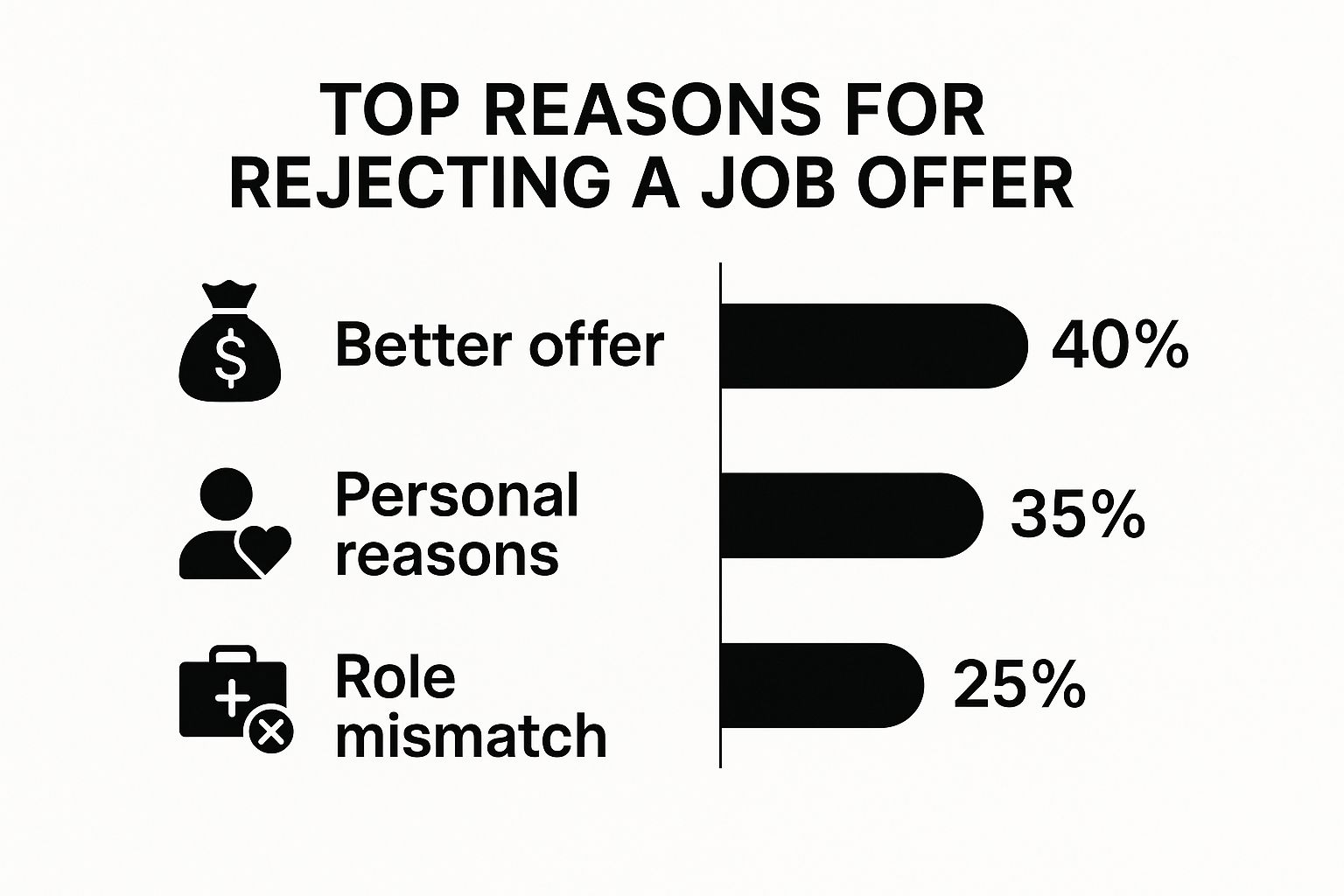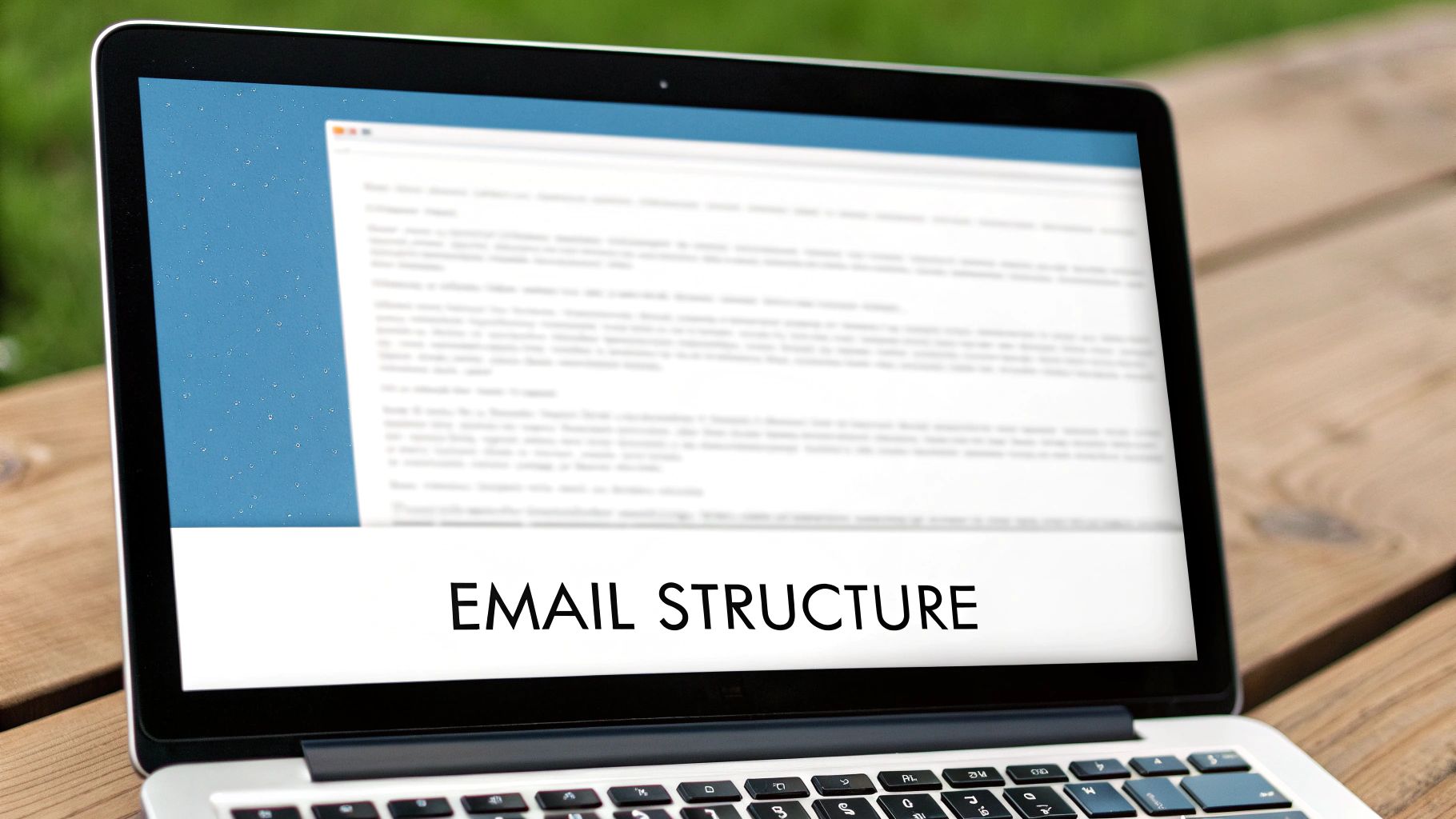Reject Job Offer Email: Pro Templates & Insights That Work
- Janis Kolomenskis
- Jun 10
- 11 min read
When Walking Away From An Offer Is The Smart Move

Let's be honest, sometimes that "dream job" offer lands in your inbox, and it... just doesn't feel right. I've been there, and I've seen friends wrestle with this too. The pressure to accept can be immense, but trust me, sometimes walking away is the best thing you can do for your career.
I remember a friend who turned down a seriously high-paying gig at a prestigious company. Why? The culture felt off, almost toxic. Everyone told her she was crazy, but guess what? Within weeks, she landed a similar role at a company she absolutely loved. It was a perfect fit.
This is where your gut instinct becomes super important. Salary and benefits are great, but look beyond those. Think about the team, your potential manager, the overall company values. Do they resonate with you? Are you genuinely excited about the work, or are you more drawn to the company's reputation? Honest self-reflection is key here.
Another thing to consider is your potential for growth. Will this role challenge you and help you level up your skills, or will you feel stuck after a year or two? This is a big one.
Also, remember the bigger picture. The job market is always evolving. For example, the forecast for high-level qualifications in Latvia's workforce is expected to jump to nearly 46% by 2025, up from 34.6% in 2013. This shift towards a more skilled workforce offers valuable insights into how competitive the job market is becoming and how important it is to find the right fit. Effective recruiting practices also come into play. Declining one offer might open doors to even better opportunities down the line.
Ultimately, saying "no" isn't about burning bridges. It's about making a strategic decision that aligns with your long-term career goals and personal values.
Mastering The Graceful Rejection Without Burning Bridges

The infographic above shows the top three reasons candidates decline job offers. It's interesting to see a better offer elsewhere just barely beats out personal reasons, with the role not being a good fit coming in third. This data highlights how important it is to ensure a strong candidate-role fit from the beginning, and that compensation isn't the only factor. Even when turning a job down, writing a well-crafted rejection email is crucial.
Let's be honest, declining a job offer can feel awkward, especially after investing time in interviews. But remember, recruiters understand this is part of the hiring process. I once declined a role that looked amazing on paper because the company culture felt too stiff and formal during my interviews. It was a difficult decision, but the right one. A few months later, I landed a much better fit with a different company through networking. Speaking of which, you might find this helpful: Check out our guide on follow-up emails.
Think Long-Term: Building Your Network
Think of a job offer rejection email as a chance to build your professional network. Expressing genuine gratitude, even while declining, makes a difference. Mentioning something specific you appreciated about the company or hiring process can leave a positive impression. This isn't about being insincere; it's about acknowledging their effort and maintaining a respectful professional connection.
This approach can open doors in the future, especially in a competitive job market. A thoughtful rejection can sometimes lead to a better opportunity down the line.
Let's look at a practical example of how different approaches can impact your professional relationships. The table below illustrates the nuances of professional vs. casual rejection emails.
Email Tone Comparison: Professional vs. Casual Rejection Approaches
As you can see, a professional approach, even in rejection, can significantly impact how you're perceived. It’s a small investment that can yield big returns in the long run.
Building Your Rejection Email From The Inside Out

Okay, let's talk about the sometimes awkward, but always important, job offer rejection email. I've chatted with recruiters, and trust me, they've seen the good, the bad, and the downright ugly. Crafting a good rejection email isn't just about saying "no," it's about doing it with grace and professionalism. It makes a difference.
The Subject Line: First Impressions Matter
Think of your subject line as your email's handshake. Make it firm and to-the-point. "Job Offer - [Your Name] - [Job Title]" works perfectly. It gets straight to the point and shows you respect their time. No guessing games needed.
Respond Quickly: Respect Their Time
Remember how much you appreciate a speedy response to your applications? Recruiters feel the same way. Aim to reply within 24-48 hours. It's just good etiquette, and it lets them move on to other candidates. Plus, it keeps you on their radar in a positive light.
Crafting the Body: Gratitude and Specificity
Start by expressing sincere thanks for the offer. Mention something you genuinely appreciated about the interview process, like a conversation with a team member or a specific aspect of the company culture. This personal touch goes a long way. For instance, "I really enjoyed learning about [Company]'s commitment to [Company Value] during my conversation with [Interviewer Name]."
It's also worth considering the current job market. Knowing what's happening in your industry provides valuable context. For instance, in Q1 2025, Latvia's unemployment rate was 7.4%, a reminder of the complex factors influencing job decisions. Here's a deeper look into Latvia's labor market.
Be Clear About Your Decision
After expressing gratitude, politely and clearly decline the offer. Don't overthink it. A simple "After careful consideration, I've decided to decline the offer at this time" works just fine. Then, briefly explain your reasoning without oversharing. Keep it professional and focused on your career goals.
Maintaining Professionalism and Authenticity
Finally, reiterate your thanks and wish them the best in their search. This leaves a positive final impression and keeps the door open for future opportunities. It's a small gesture that speaks volumes about your professionalism. By following these tips, you can write a rejection email that's both polite and memorable – the kind that makes a recruiter think, "Wow, what a class act."
Battle-Tested Templates For Every Rejection Scenario

This screenshot shows LinkedIn's recommended process for withdrawing your application. Helpful for pre-offer situations, sure, but it highlights how important clear communication is throughout the hiring process. Once you’re at the offer stage, you need a solid rejection email strategy.
Let’s be honest, generic templates are useless. You need rejection emails that actually resonate with hiring managers, and I’m here to help you with that. These templates are battle-tested – I’ve used them and refined them based on feedback from recruiters.
Scenario 1: Compensation Doesn't Align
"Dear [Hiring Manager Name], Thank you so much for offering me the [Job Title] position. After careful consideration, I've decided to decline because the compensation package doesn't meet my current financial needs. I truly appreciate the time you invested in me, and I was particularly impressed with [mention something specific, like the company culture or a project they discussed]."
Remember, being specific shows you were paying attention and makes the rejection feel less like a form letter.
Scenario 2: Another Offer Wins
"Dear [Hiring Manager Name], I'm writing to express my sincere gratitude for the [Job Title] offer. While I was incredibly impressed with [Company Name] and the team, I've accepted another opportunity that's a better fit for my long-term career goals. I enjoyed learning about the innovative work you're doing."
Highlighting your career goals makes your decision seem more strategic and less personal.
Scenario 3: Post-Negotiation Walk Away
"Dear [Hiring Manager Name], Thank you again for offering me the [Job Title] position and for the productive conversations we’ve had. Unfortunately, we haven't been able to reach a mutually agreeable compensation package, so I’ve decided to decline. I wish you all the best in finding a suitable candidate."
Keep it brief and respectful, acknowledging the negotiation process. Don't burn bridges.
Scenario 4: Life Happens – Last-Minute Change
"Dear [Hiring Manager Name], I’m writing with sincere apologies. Due to unforeseen personal circumstances, I need to withdraw my acceptance of the [Job Title] offer. This was a difficult decision, and I appreciate your understanding."
In sensitive situations like this, less is more. Keep it short, polite, and don’t feel obligated to over-explain.
These templates are just a starting point. Adapt them, add your own voice, and always, always be professional. Even a rejection is a networking opportunity. Hiring managers appreciate honesty and directness. A well-crafted rejection email can leave a surprisingly positive impression.
Rejection Email Disasters That Haunt Professional Reputations
Let's be honest, writing a job rejection email is never fun. But getting it wrong can have some serious consequences. I've been in HR long enough to hear some truly cringeworthy stories, the kind that become legendary cautionary tales whispered around the water cooler. Trust me, you don't want to be the subject of one of those stories. So let's talk about some common rejection email disasters and how to avoid them.
Oversharing: When Honesty Becomes Too Much Information
Honesty is important, but there's a fine line. Picture this: you reject a candidate, and they respond by telling you all about the amazing offer (including the salary!) they accepted from your competitor. Ouch. Not only is it unprofessional, but it also burns bridges. A simple "Thank you for your interest, but we’ve decided to move forward with another candidate" is usually enough. Keep it brief, keep it respectful.
The Insulting Rejection: Unintentional Offense
Sometimes, in an attempt to be helpful, we accidentally cause offense. Suggesting a company "improve their benefits package" or implying the role "wasn't challenging enough" in a rejection email? Huge mistake. It’s not about them; it's about you. Focus on your reasons for declining the offer.
Ghosting: The Ultimate Professional Faux Pas
In the world of professional etiquette, ghosting after a job offer is a cardinal sin. It's disrespectful to the hiring team, who invested time and effort in you, and it damages your reputation. Even a short, simple rejection email is better than radio silence. Remember, the professional world can be surprisingly small, and word travels fast.
Damage Control: Recovering From a Rejection Email Blunder
Okay, so you messed up. You sent a rejection email you instantly regretted. Is all hope lost? Not necessarily. Reach out to the hiring manager, apologize sincerely for any miscommunication, and reiterate your appreciation for their time. It might not completely erase the initial impression, but it shows you're professional and willing to own your mistakes. Building and maintaining professional relationships is key, so don't underestimate the power of a sincere apology.
Let's face it, everyone makes mistakes. But by being mindful of these common pitfalls, you can avoid turning a simple rejection email into a career-damaging disaster.
Let's talk about some specific examples of what not to do. The table below outlines some frequent rejection email mistakes, how often they occur, and the potential impact on your professional reputation.
This table gives you a concrete idea of what can go wrong and how challenging it can be to fix the damage. So, take the time to craft your rejection emails carefully. It’s a small investment of time that can protect your professional reputation in the long run.
Turning Today's Rejection Into Tomorrow's Perfect Opportunity
A job rejection email stings, no doubt. But it’s not the end of the world, and honestly, it might not even be the end of the story with that company. Think of it less like closing a door and more like taking a detour. That detour could even lead you right back to them later on, maybe even for a role that's an even better fit. I've actually seen this happen. A friend of mine had to turn down a position because the timing wasn't right for her family. She stayed in touch with the hiring manager, and a year later, they reached out to her about a different opening – it was perfect, and she landed the job!
This is why building relationships strategically is so important. After you send that rejection email, think about how you can stay on their radar without being annoying. Connecting on LinkedIn is a great first step. Every now and then, engage with their content – it shows you’re still interested in what they're doing. For example, if they post about a project that aligns with your skills, leave a thoughtful comment. This keeps your name in their minds without being intrusive. Here's something you might find helpful: Check out our guide on employee referral programs.
Handling Follow-Up Questions
Sometimes, hiring managers will reach out after you've rejected an offer. This is a really good sign! It means they were genuinely impressed with you and want to understand your decision. Be ready to briefly and professionally explain your reasoning again. For instance, if the role wasn’t the right match for your skillset, you could say something like, "I truly appreciate the offer, but I’m currently concentrating on roles that let me use my expertise in [your area of expertise]."
Rejection-to-Hire Success Stories
Turning a rejection into a future job offer isn’t just wishful thinking. I know someone who passed on a sales position because it just wasn't a good fit for him. He kept in touch with the company, and six months down the line, they contacted him about a marketing opening – he took it and absolutely thrived in that role. This story really highlights how valuable it is to maintain those professional connections. By handling rejection gracefully and staying engaged, you open doors to opportunities you might never have imagined. Remember, a "no" today could very well turn into a "yes" to something even better tomorrow.
Key Takeaways For Professional Rejection Success
Navigating the job market can be a rollercoaster. Sometimes you have to make tough calls, and declining a job offer is definitely one of them. Knowing how to write a solid rejection email is a real game-changer for your professional reputation. Here’s the inside scoop on how to do it right.
Clarity and Speed Are Your Allies
First things first: don't leave them hanging. Respond within 24-48 hours. This shows respect for the hiring manager’s time and keeps things moving along. Your email should be clear and concise. Get straight to the point—no need to beat around the bush. State your decision upfront.
Gratitude Goes a Long Way
A little gratitude goes a long way. Thank the hiring manager for their time and the opportunity. Even better, mention something specific you appreciated, like a great conversation you had with a team member. This personal touch makes all the difference.
Professionalism Trumps Casualness
Keep it professional. This isn’t the time for casual language or slang. Think of it as a formal business letter, even though it's an email. This reinforces your professional image.
Honesty, With Tact
Be honest about why you're declining, but don't overshare or criticize the company or the role. Focus on your career goals and why this particular opportunity isn't the right fit for you. It shows self-awareness and professionalism.
Turning Rejection Into Opportunity
Remember, a rejection email isn't the end of the world. In fact, it can be an opportunity. Express your continued interest in the company (if you are genuinely interested, of course!) and leave the door open for future possibilities. You never know what the future might hold.
By following these tips, you can turn a potentially awkward situation into a positive networking experience. You’ll decline the offer gracefully, maintain your professional reputation, and maybe even build some valuable connections for the future. Looking to streamline your hiring process and improve your candidate experience? Check out Yena, an AI-powered ATS that's changing the recruitment game.

Comments